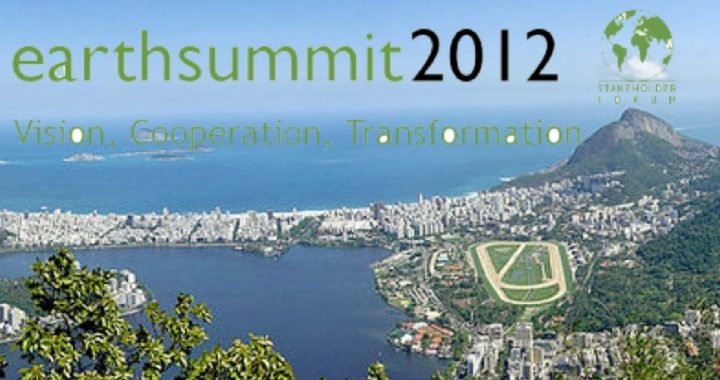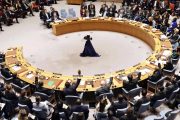
The United Nations will be pushing for an expansion of its already powerful global environmental agency at this year’s Earth Summit in Rio de Janeiro June 20-22. The UN Environmental Program (UNEP) will be renamed the UN Environmental Organization (UNEO) and promoted to the level of a “specialized agency,” giving it more authority and allowing it to receive more funding.
The ultimate purpose of the organization’s restructuring is to support the Sustainable Development division of the UN, the same division that has imposed the radical and highly controversial Agenda 21 policies on nations across the globe.
The expansion is a recommendation of the global sustainability panel put together by UN Secretary General Ban Ki-moon. The panel states,
One option is the possible transformation of UNEP into a specialized agency of the United Nations. A strengthened UNEP could enhance coherence between relevant multilateral environmental agreements, and better integrate its work with the activities of development institutions, especially the United Nations Development Program.
According to the United Nations, funding of the agency is to be voluntary, but “assessed contributions” may also be allotted to the agency based on the agency’s needs and signs of success.
Susanne Posel of Occupy Corporatism explains, “Specialized agencies within the UN receive these ‘assessed contributions’ by member states as derived from factors such as national income and gross domestic product.”
The expansion of the UN’s environmental agency has been advocated for some time by the European Union. At an EU Summit back in 2007, then-French President Jacques Chirac called for “a massive international action to face the environmental crisis.” He added,
We are coming to realize that the entire planet is at risk, that the well-being, health, safety, and very survival of humankind hangs in the balance. We call for the transformation of the UNEP into a genuine international organization to which all countries belong, along the lines of the World Health Organization.
Meanwhile, there is a predictable agenda behind these changes: a continued push toward global government.
Gustave Speth, former head of the World’s Resource Institute, declared back in 1997, “”Global governance is here to stay. And driven by economic and environmental globalization, global governance will inevitably expand.”
The environmental agenda easily allows for the United Nations to push for global government.
Recently, the UN has been claiming that the Kyoto Protocol is unfairly applied and is pushing for a global treaty to address the issue of carbon emissions. (The 1997 Kyoto treaty signed in Japan provides money for poorer governments while limiting the CO2 emissions of industrialized countries, which the UN blames for climate change. It also created a fledgling global “market” for so-called “carbon credits.”) Predictably, the treaty would restrict national sovereignty and force governments to pay carbon taxes as a means to fund the development and manufacturing of products that climate change enthusiasts can then sell to nations in preparation for the so-called “global warming age.”
Many analysts claim that the push to convince Americans that manmade climate change is in fact real is intended to allow the government to acquire greater control over its citizens, and may potentially lead to “global governance.” After all, former Vice President Al Gore, a leading spokesman of the climate change movement, has declared that one way to combat climate change is “through global governance and global agreements.”
In December 2007, the United Nations climate conference in Bali urged the adoption of a global carbon tax that would represent “a global burden sharing system, fair, with solidarity, and legally binding to all nations.” The proposal prompted one of the advocates, Othmar Schwank, to comment, “Finally someone will pay for these [climate-related] costs.”
As noted by Posel, a global carbon tax system would redistribute the world’s wealth and “force ecological taxes to steer large amounts of money into funds designed to redesign humanity, civilization and the planet.” She stated that a carbon cap and trade system would be quite lucrative, generating an estimated $250 billion per year.
The United Nations claims:
By fundamentally restructuring public spending and leveraging private investments towards environmental and social investments, indebted industrial countries can expect to find new growth paths that support fiscal consolidation while contributing to a green economy.
In order to fully establish global governance, the UN recognizes that it must destroy powerful industrialized nations. In 1990, Maurice Strong, head of the United Nations Environmental Program, made the following radical statement that bears an all-too-close resemblance to how the climate change agenda is playing out:
What if a small group of these world leaders were to conclude that the principal risk to the earth comes from the actions of the rich countries? In order to save the planet, the group decides: Isn’t the only hope for the planet that the industrialized civilizations collapse? Isn’t it our responsibility to bring this about?
Strong later attempted to explain his statement by asserting it was a speculative plot for a novel that he was considering writing, but he has never yet penned such a novel.
Wealth redistribution is clearly a component of the climate change agenda, and even members of the UN have openly admitted it. During an interview with Germany’s NZZ Online Sunday, UN official Ottmar Edenhofer observed, “We redistribute de facto the world’s wealth by climate policy.”
The interview went as follows:
(NZZ AM SONNTAG): The new thing about your proposal for a Global Deal is the stress on the importance of development policy for climate policy. Until now, many think of aid when they hear development policies.
(OTTMAR EDENHOFER, UN IPCC OFFICIAL): That will change immediately if global emission rights are distributed. If this happens, on a per capital basis, then Africa will be the big winner, and huge amounts of money will flow there. This will have enormous implications for development policy. And it will raise the question if these countries can deal responsibly with so much money at all. …
(NZZ): De facto, this means an expropriation of the countries with natural resources. This leads to a very different development from that which has been triggered by development policy.
(EDENHOFER): First of all, developed countries have basically expropriated the atmosphere of the world community. But one must say clearly that we redistribute de facto the world’s wealth by climate policy. Obviously, the owners of coal and oil will not be enthusiastic about this. One has to free oneself from the illusion that international climate policy is environmental policy. This has almost nothing to do with the environmental policy anymore, with problems such as deforestation or the ozone hole.
The climate change alarmists have grown increasingly brazen about the true purpose of their agenda.
The agenda to be discussed at the upcoming UN Conference on “Sustainable Development” is outlined in its published report entitled, “Working Towards a Balanced and Inclusive Green Economy: A United Nations System-wide Perspective.”
The report states, “Transitioning to a green economy requires a fundamental shift in the way we think and act.” It calls for increased “education,” information, and “awareness” efforts to help “change individual and collective behavior” in lifestyles as well as consumption and production patterns. The agenda will necessitate “a serious rethinking of lifestyles in developed countries.”
Related article: UN Climate Conference Seeks New Global Treaty




